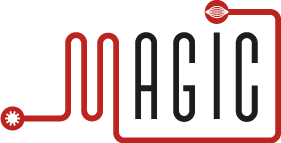London, July 11, 2023 – We are thrilled to announce the launch of the groundbreaking project “MAGIC” (Next-generation Models And Genetic therapIes for rare neuromusCular diseases). This ambitious four-year initiative jointly funded (~9.5M EUR) by Horizon Europe and UK Research and Innovation (UKRI) brings together 15 international partners to transform the treatment landscape for muscular dystrophies, which are severe genetic disorders with limited treatment options.
Muscular dystrophies are characterised by muscle weakness and wasting, causing impaired mobility and often decreased life expectancy. They pose significant challenges for patients, carers, clinicians and researchers. Despite progress in genetic therapies for other neuromuscular disorders, there is currently limited evidence of clinical efficacy for gene therapy or genome editing in muscular dystrophies. The MAGIC consortium aims to change this by developing advanced models of human skeletal muscle and innovative gene therapy approaches.
Led by Prof. Francesco Saverio Tedesco from University College London and The Francis Crick Institute, along with the support of Prof. Mario Amendola from Inserm and the Genethon Institute, the MAGIC consortium consists of 15 partners from 9 countries, including:
- Academic institutions and research hospitals:
- University College London (UK)
- Inserm (France)
- Hannover Medical School (Germany)
- Université Paris-Est Créteil Val de Marne (France)
- Cincinnati Children’s Hospital Medical Center (USA)
- Maynooth University (Ireland)
- King’s College London (UK)
- The Francis Crick Institute (UK)
- Small and medium-sized enterprises (SMEs):
- BI/OND Solutions (Netherlands)
- VIVEbiotech (Spain)
- ReiThera (Italy)
- Siegfried DiNAMIQS (Switzerland)
- Charitable organisations:
- Muscular Dystrophy UK (UK)
- Parent Project aps (Italy)
- Duchenne Data Foundation (Netherlands)
The primary goal of the MAGIC consortium is to create accurate humanised muscle models to enable precise development of gene therapies and genome editing strategies for muscular dystrophies. By using cutting-edge technologies such as microfabrication, microfluidics, and human stem cell differentiation, the consortium will engineer disease-specific muscle-on-chip devices. These models will allow researchers to assess safety and efficacy of novel gene therapies
based on adeno-associated and lentiviral vectors specific to muscle cells. Such vectors will be equipped with innovative regulatory elements that ensure precise expression of therapeutic genes in specific muscle cells, reducing potential immune responses. Additionally, the project will also explore new gene editing strategies for incurable neuromuscular disorders, targeting specific mutations in diseases such as Duchenne muscular dystrophy (DMD), X-linked centronuclear myopathy (XLCNM), and LMNA- and COL6-related congenital muscular dystrophies (CMDs).
Importantly, MAGIC actively involves multiple SMEs to facilitate translation and exploitation of the key project outputs, as well as national and international patient advocacy groups (Muscular Dystrophy UK, Duchenne Data Foundation, and Parent Project aps) to ensure that patients’ perspective remains central to the research.
Prof. Francesco Saverio Tedesco is optimistic about the impact of MAGIC: “This project represents a significant step forward in the search for effective treatments for muscular dystrophies. Through cutting-edge bioengineering, innovative genetic therapies, and advanced preclinical translation, we aim to make a difference in the lives of people affected by these devastating diseases.”
Please connect with MAGIC via Twitter and LinkedIn to stay up to date on the latest project developments.
For more information about the MAGIC project, please visit https://magic-horizon.eu or contact us at: info@magic-horizon.eu
About the MAGIC project:
The MAGIC (Next-generation Models And Genetic therapIes for rare neuromusCular diseases) consortium brings together leading international institutions, SMEs and patient advocacy groups to accelerate development of gene therapies for muscular dystrophies. By creating advanced human quasi vivo models, developing tissue-specific vectors, and exploring gene editing strategies, the consortium aims to overcome the barriers that have hindered the translation of genetic therapies into clinical applications. Through collaboration, innovation, and a patient-centred approach, the MAGIC consortium is committed to making a meaningful impact on the lives of individuals affected by muscular dystrophies.
 |
Funded by the European Union. Views and opinions expressed are however those of the author(s) only and do not necessarily reflect those of the European Union and HADEA. Neither the European Union nor the granting authority can be held responsible for them. |
 |
This work is funded by UK Research and Innovation (UKRI) under the UK government’s Horizon Europe funding guarantee grant numbers 10080927, 10079726, 10082354 and 10078461. |




